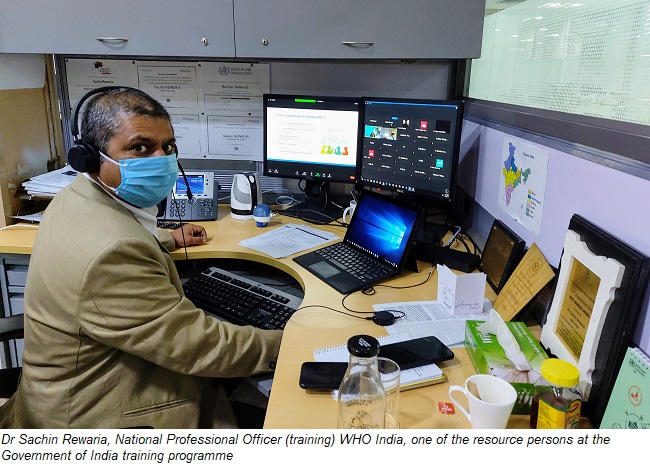National and provincial teams from 13 countries across three continents participated in January in a Government of India (GoI) initiative to share its experience in rolling out the world’s largest vaccination drive.
The GoI is parallelly holding a series of trainings to help partner countries strengthen their clinical research capacities.
The virtual “training of trainers” module on the vaccination rollout in January had participants from Bangladesh, Bahrain, Bhutan, Brazil, Maldives, Mauritius, Mongolia, Morocco, Myanmar, Nepal, Oman, Seychelles, and Sri Lanka, connecting across time zones to understand how the GoI’s vaccine rollout could be adapted to deliver COVID-19 shots to priority populations in their own countries.

While Nepal, Bangladesh and Sri Lanka have begun COVID-19 vaccination drives in their respective countries to immunize health care and frontline workers with the Oxford-AstraZeneca Covishield vaccine from India, other participating countries are on the cusp of beginning vaccination drives and are exploring ways to customize India’s experience to their national context.
“Several countries observed the world’s largest vaccine drive being rolled out in our country and reached out to India to learn more about the level of intersectoral coordination, infrastructure and training preparedness, governance and accountability mechanisms, and operational and reporting efficiencies that are needed to launch a programme of this scale. The training was organized for participants from 13 countries who sought more information on the rollout,” said Union Health and Family Welfare Minister Dr Harsh Vardhan.
There were more than 400 logins for the 5.30 hours session, which was split over two days.
“Vaccines enabled India to eradicate polio and small pox. We run the largest immunization programme in the world to vaccinate children and young mothers against vaccine-preventable disease. We are happy to share our experience of vaccinating at scale with other countries, who can adapt our experiences to launch their own vaccination to end COVID-19,” said Dr Vardhan.
Microplanning ensures a uniform level of preparedness across all vaccination sites. “Technical officers from WHO India and UNICEF assisted national and state-level government officials to train participants on setting up vaccination sites, vaccine logistics and cold chain management, safe injection practices and waste disposal, training health staff, reporting and management of adverse events following immunization, monitoring and supervision, and recording and reporting. Support is also being provided on advocacy, communication and social mobilization,” said Dr Roderico H Ofrin, WHO Representative to India.
WHO field teams are continuing to provide technical assistance and surge support for trainings, microplanning and monitoring of COVID-19 vaccination. More than 260,000 vaccinators and around 475,000 other vaccination team members have been trained across the country with support from WHO India.
UNICEF India, which supported GoI in advocacy, communication and social mobilization, briefed countries on how to customize messaging depending on the key social media platforms being used in the country.
In a parallel initiative, GoI is supporting COVID-19 vaccine development activities in partnering countries under the Department of Biotechnology (DBT)’s Partnerships for Accelerating Clinical Trials (PACT) initiative that is conducting trainings to strengthen clinical research capacity and facilitate phase-III clinical trials of Indian COVID-19 vaccines in other countries, including neighbouring ones.
The initiative is being implemented by Biotechnology Industry Research Assistance Council (BIRAC) and Clinical Development Services Agency (CDSA) under the National Biopharma Mission and Ind-CEPI Mission of DBT.
“DBT is working closely with the Ministry of External Affairs, Indian Council of Medical Research, Central and Drugs Standard Control Organisation for this science-diplomacy initiative to support COVID-19 vaccine development activities in partnering countries,” said Dr Harsh Vardhan.
The international partners, which included CEPI, WHO and National Institute of Health, organized the first in a series of trainings on “Strengthening clinical trial research capacity in India’s friendly countries” from September to December 2020. Close to 700 participants from Afghanistan, Bangladesh, Bhutan, Maldives, Mauritius, Nepal and Sri Lanka have participated.
Series 2 of the clinical trials training is expected to begin on 5 February 2021, with participants from Ethiopia, Kenya, Nigeria, Bahrain, Bhutan, Oman, Nepal, Viet Nam and Myanmar, have expressed interest in participation.
All courses are currently being held online, but hands-on training sessions are under consideration to enhance the learning experience.